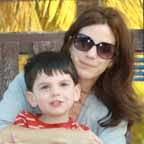.jpg)




 As Earth Day has just passed, AND I have just seen the movie EARTH, I thought it would be interesting to feature Loree Griffin Burns, the author of Tracking Trash: Flotsam, Jetsam, and the Science of Ocean Motion. Her book which is part of Houghton Mifflin's "Scientists in the Field Series" tells the story of oceanographer Dr. Curtis Ebbesmeyer who began to track flotsam (trash) that spilled into the ocean. He is aided in his studies by an army of beachcombers. The information he finds is startling, and is significant in understanding and protecting and preserving marine habitats and their inhabitants. Here's what Loree has to say about her experience as an author, and a mother...(my comments are in italics)
As Earth Day has just passed, AND I have just seen the movie EARTH, I thought it would be interesting to feature Loree Griffin Burns, the author of Tracking Trash: Flotsam, Jetsam, and the Science of Ocean Motion. Her book which is part of Houghton Mifflin's "Scientists in the Field Series" tells the story of oceanographer Dr. Curtis Ebbesmeyer who began to track flotsam (trash) that spilled into the ocean. He is aided in his studies by an army of beachcombers. The information he finds is startling, and is significant in understanding and protecting and preserving marine habitats and their inhabitants. Here's what Loree has to say about her experience as an author, and a mother...(my comments are in italics)In the Spring of 2003, while on hiatus from my career as an academic research scientist and raising three young children, an article in the local newspaper captured my imagination. It told of a shipping accident that had dumped 30,000 bathtub toys—plastic ducks, beavers, frogs, and turtles—into the Pacific Ocean in 1992. Eleven years later, the toys were thought to have reached the Atlantic and scientists predicted they would soon begin washing ashore in New England. I found this fascinating and dug into the story a bit. The more I learned about those ducks, and the grown man whose job was to chase them around the ocean, the more I was convinced that the story would make a great hook for an oceanography book for young readers. I decided to write it.
2. What was your next big break?
I spent a year researching the story and writing a book proposal. During that time I had come across Houghton Mifflin’s Scientists in the Field series and decided my book project fit the series nicely. I modeled my vision after books in the series, took a deep breath, and sent a proposal to Houghton. I was thrilled (and more than a little shocked!) when they offered me a contract to write the book. (Doing extensive research to match your concept to a publisher who fits your style is one of the most important steps you can take to get your book published! Good work Loree!)
3. What is your educational background?
I have a Ph.D. in biochemistry, of all things. That background explains my taste in book projects, though; I am drawn to stories of passion and discovery.
4. Where do you get your inspiration?
I find story ideas everywhere. Newspaper and magazine articles, places I visit, interesting things I see during the course of a day. Several months ago I took my kids to the Butterfly Garden at Boston’s Museum of Science and happened to spot a pair of mating butterflies on a tree. Outdoors, this sight wouldn’t have surprised me. But I happened to know that most indoor butterfly gardens are not allowed to breed butterflies, which meant this pair was technically breaking the law! I asked the curator a few simple questions and, Voila!, a new book project was born. (Who says ideas don’t grow on trees?)
5. What were some of your first rejections, and what made you keep going?
Like most writers, I‘ve had my share of rejection. One of my absolute favorite book projects—the picture book biography of an eighteenth century bug scientist who conducted simple and amazing experiments on live insects—has been rejected by twelve publishing houses. I keep working on the piece because I am passionate about the story; I believe one day I will tell it just right, will find an editor who loves it as much as I do, and will see it published. I guess what keeps me going is passion for the stories I want to share.
6. What advice would you give to someone just starting out?
Take yourself seriously. I wrote for years—decades, really—and dismissed that work as just a hobby. It wasn’t until I began to take myself seriously, which for me meant demanding the time and space to work, that a career began to unfurl.
7. How do you carve out time for writing while raising three busy children?
It's an endless struggle for balance. My twin sons are 10 and my daughter is seven and I simply do the best I can. What has worked best for me is to find a time that can be all mine. For many years, that was 5-7am. I worked hard to make that time sacred for myself ... no housework, no showers, no exercising, no preparing for the day ahead ... this was my writing time. Beyond it, I caught time as I could: stolen hours after the kids were in bed, a weekend afternoon when the kids were off with their dad somewhere, an hour or two when I hired a sitter. Somehow it worked. (I should mention too that I pretty much gave up television. Oh, the hours I gained there!)
Now that all three of my kids are in school full time, I have more flexibility. I still use that early morning time for work, but not as religiously as I once did. I spend some days at home working, some days at home cooking and cleaning (someone has got to do it!), some days in the field researching book projects, and some days sharing my work with students in schools. How much work I can handle is limited by my family life, and this helps me set boundaries. There are always going to be days when my work interferes with my family (I missed a goodly number of soccer games last fall in order to make my bee book deadline) and, likewise, there are times when my family life pre-empts my work (there is an editor out there patiently waiting for a promised revision that I simply can't fit into my life right now). I try to focus on the fact that I am able to do all the things I love and not worry so much about how hard it is to do them all in a timely manner.
8. What are you working on next?
My second book, The Hive Detectives, will be published by Houghton Mifflin next year; this new Scientists in the Field book explores the recent baffling disappearance of managed honey bee populations and, of course, the scientists working to understand it. I am also working on a book about citizen scientists; research for that book has had me birdwatching in Central Park, butterfly hunting in central Mexico, and frog counting in my own backyard!
Many thanks to Loree for sharing her incredible story!
Images:
Head shot: © Ellen Harasimowicz
Tracking Trash book cover
Butterflies mating: © Loree Griffin Burns
All other photos: © Betty Jenewin














4 comments:
Thanks for inviting me to be part of your Author Series, Heather. I enjoyed our 'chat'!
Best,
Loree
Thanks for the amazing interview!
It's very inspiring to hear how Loree juggles all her different roles. I enjoyed reading how a book came to be from just a newspaper story. It sounds like a fascinating tale.
Great interview!
Post a Comment